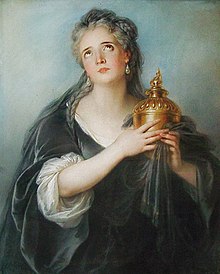Adrienne Lecouvreur

Adrienne Couvreur , called Lecouvreur , (born April 5, 1692 in Damery near Épernay , † March 20, 1730 in Paris ) was considered the most important French actress of her time.
Life
Adrienne Lecouvreur was the daughter of a laundress and a rock maker. She had her first engagement in the theater of Lille and then went to Paris, where she first attracted attention in 1717 in Jean Racine's drama Mithridate . In June of the same year she entered the Comédie-Française , where she succeeded as a tragic heroine and achieved great success with the audience.
Lecouvreur had numerous affairs, including with Count Moritz von Sachsen , an illegitimate son of Augustus the Strong. This love affair and the rivalry with the Duchess of Bouillon based on it was rumored to be linked to her unexpected death at the age of only 37. In fact, she probably died of an "abdominal infection" in the arms of her friend Voltaire , to whom she was closely linked both artistically and personally. A few days before her death, she was still on stage in the role of Jokaste from Voltaire's Oedipus .
The church, which considered acting a disreputable activity, refused to give her a Christian burial and she was buried without a priest in the embankment of the Seine , on what is now the Champ de Mars . This circumstance led Voltaire to the ode la mort de Mademoiselle Lecouvreur with the closing verse: «Dieux! pourquoi mon pays n'est-il plus la patrie / Et de la gloire et des talents? » (" Heaven! Why is my country no longer the home / Both of fame and talent? ")
The veneration that was bestowed on her after her death, and the enlightening criticism of the church that manifested itself in the process, is expressed in the short passage from the Règlement pour l'Opéra de Paris, avec des notes historiques of a "Monsieur de Querlon" (pseudonym ) from 1743: “Toi qui méritais des autels, et qu'un cruel préjugé priva du tombeau, divine Le Couvreur, qu'il me soit permis de jeter en passant quelques fleurs sur tes cendres indignées de notre barbarie. [...] Le temps qui abat les fières Pyramides et qui ruine les orgueilleux monuments ne peut rien contre ta mémoire. " (" You, who deserved altars and who was robbed of the grave by a cruel prejudice, divine Le Couvreur, may I, in passing, lay some flowers with your ashes, which are indignant at our barbarism. [...] The Time that brings down the proud pyramids and destroys the haughty monuments can do nothing against the memory of you. ")
Stage and film
The story of Adrienne Lecouvreur was the subject of a play by Eugène Scribe (1849, German by Th. G. Hermann 1850), an opera by Francesco Cilea ( Adriana Lecouvreur , first performed in 1902 with Enrico Caruso , sound recording 1954 with Maria Callas ) and an operetta ( Adrienne ) by Walter Wilhelm Goetze and for three film adaptations called Adrienne Lecouvreur ( 1913 , 1938 and 1955), the first of which with Sarah Bernhardt in the leading role. Giuseppe Verdi briefly considered writing a musical work about the actress.
Web links
- Database on Adrienne Lecouvreur with additional web links
- Voltaire's Ode to Adrienne Lecouvreur in English translation
- Voltaire's ode to Adrienne Lecouvreur in German translation
literature
- Jack Richtman: Adrienne Lecouvreur. The Actress and the Age. A biography. Prentice Hall, Englewood Cliffs NY 1971, ISBN 0-13-008698-3 .
Remarks
- ↑ Cf. Georg Holmsten, Voltaire , Hamburg 1985, p. 48.
| personal data | |
|---|---|
| SURNAME | Lecouvreur, Adrienne |
| ALTERNATIVE NAMES | Lecouvreur; Couvreur, Adrienne (maiden name) |
| BRIEF DESCRIPTION | french actress |
| DATE OF BIRTH | April 5, 1692 |
| PLACE OF BIRTH | Damery (Marne) at Eperney |
| DATE OF DEATH | March 20, 1730 |
| Place of death | Paris |